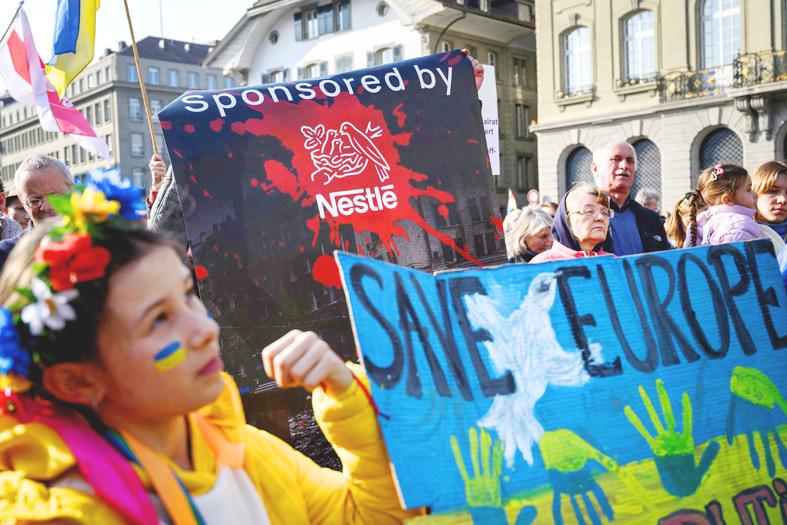Nestle SA said it does not make a profit from its remaining activities in Russia, as the world’s largest food maker increasingly comes under pressure to completely stop operating in the country amid the war in Ukraine.
Ukrainian President Volodymyr Zelensky on Saturday called out Nestle for still doing business in Russia in a streamed speech to thousands of protesters in the Swiss capital, Bern.
Earlier this month, the Swiss company halted shipments of non-essential products to Russia, such as Nespresso capsules and San Pellegrino bottled water. However, it keeps selling baby food, cereals and some pet foods there.

Photo: AFP
“We do not make a profit from our remaining activities,” a spokesperson said by e-mail. “The fact that we, like other food companies, supply the population with important food does not mean that we simply continue as before.”
The Ukrainian government has been singling Nestle out as one of the companies that has not fully suspended activities in Russia.
Swiss Prime Minister Denys Shmyhal last week posted on Twitter that Nestle chief executive officer Mark Schneider has shown no understanding and that he hoped he would soon change his mind.
Shmyhal’s comment elicited responses calling for the boycott of Nestle products and shows the growing pressure on multinationals that keep businesses open in Russia. The war has spurred an exodus from that market by US, European and other companies after the invasion of Ukraine.
“We are doing whatever we can in Ukraine and neighboring countries to help alleviate this humanitarian catastrophe,” Nestle said. “We are still one of the few active food companies in Ukraine and sometimes even manage to distribute food in Kharkiv.”

SEEKING CLARITY: Washington should not adopt measures that create uncertainties for ‘existing semiconductor investments,’ TSMC said referring to its US$165 billion in the US Taiwan Semiconductor Manufacturing Co (TSMC, 台積電) told the US that any future tariffs on Taiwanese semiconductors could reduce demand for chips and derail its pledge to increase its investment in Arizona. “New import restrictions could jeopardize current US leadership in the competitive technology industry and create uncertainties for many committed semiconductor capital projects in the US, including TSMC Arizona’s significant investment plan in Phoenix,” the chipmaker wrote in a letter to the US Department of Commerce. TSMC issued the warning in response to a solicitation for comments by the department on a possible tariff on semiconductor imports by US President Donald Trump’s

‘FAILED EXPORT CONTROLS’: Jensen Huang said that Washington should maximize the speed of AI diffusion, because not doing so would give competitors an advantage Nvidia Corp cofounder and chief executive officer Jensen Huang (黃仁勳) yesterday criticized the US government’s restrictions on exports of artificial intelligence (AI) chips to China, saying that the policy was a failure and would only spur China to accelerate AI development. The export controls gave China the spirit, motivation and government support to accelerate AI development, Huang told reporters at the Computex trade show in Taipei. The competition in China is already intense, given its strong software capabilities, extensive technology ecosystems and work efficiency, he said. “All in all, the export controls were a failure. The facts would suggest it,” he said. “The US

The government has launched a three-pronged strategy to attract local and international talent, aiming to position Taiwan as a new global hub following Nvidia Corp’s announcement that it has chosen Taipei as the site of its Taiwan headquarters. Nvidia cofounder and CEO Jensen Huang (黃仁勳) on Monday last week announced during his keynote speech at the Computex trade show in Taipei that the Nvidia Constellation, the company’s planned Taiwan headquarters, would be located in the Beitou-Shilin Technology Park (北投士林科技園區) in Taipei. Huang’s decision to establish a base in Taiwan is “primarily due to Taiwan’s talent pool and its strength in the semiconductor

French President Emmanuel Macron has expressed gratitude to Hon Hai Precision Industry Co (鴻海精密) for its plan to invest approximately 250 million euros (US$278 million) in a joint venture in France focused on the semiconductor and space industries. On his official X account on Tuesday, Macron thanked Hon Hai, also known globally as Foxconn Technology Group (富士康科技集團), for its investment projects announced at Choose France, a flagship economic summit held on Monday to attract foreign investment. In the post, Macron included a GIF displaying the national flag of the Republic of China (Taiwan), as he did for other foreign investors, including China-based